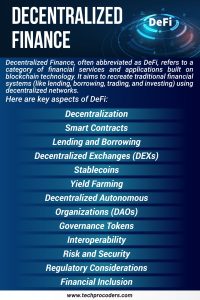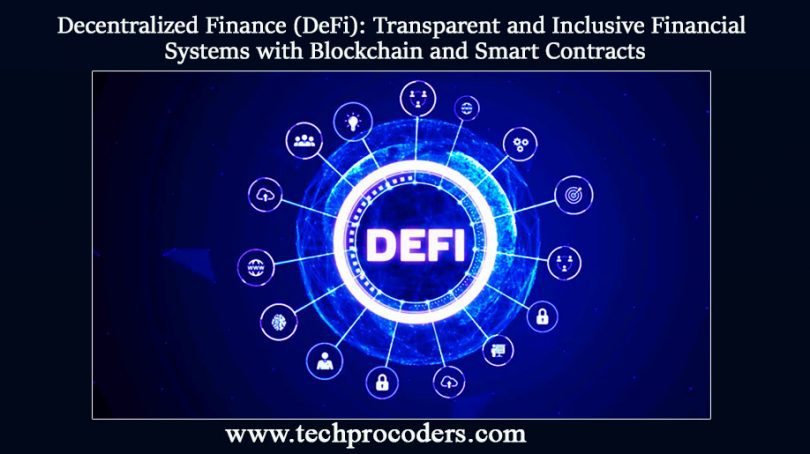A groundbreaking idea in the blockchain and cryptocurrency world is DeFi, decentralized finance provides a decentralized alternative to traditional financial institutions.
Today, we’ll shift into the domain of DeFi and examine its foundational ideas, advantages and the various uses it enables. Additionally, we will explore the progress and benefits of Decentralized Finance (DeFi) protocols.
Understanding Decentralized Finance (DeFi):
Using blockchain technology and digital contracts, the revolutionary financial system known as “DeFi” runs. This system stands out for its openness, inclusiveness, and unlimited access, enabling anyone to conduct financial transactions without the aid of middlemen or centralized organizations. DeFi protocols use the strength of decentralized networks to facilitate peer-to-peer transactions, doing away with the requirement for middlemen that are necessary for traditional financial systems like banking and other financial organizations.

Exploring Diverse DeFi Applications and Use Cases:
DeFi covers a broad range of use cases that are changing the financial environment. Let’s now examine some of the popular DeFi protocols in more detail.
Unlocking Financial Opportunities: Decentralized Lending and Borrowing Platforms in DeFi.
Sites like Compound and Aave let users lend their cryptocurrency holdings and receive interest or borrow money by putting their assets as security. Artificially intelligent agreements, which automatically carry out lending and borrowing deals depending on specified circumstances, power these platforms.
Embracing Decentralization: Exploring Instant and Direct Digital Currency Trading via AMMs and DEXs.
Users can trade digital currencies instantly and directly from their wallets or accounts without using a centralized exchange; special thanks to AMMs, such as Uniswap and SushiSwap. DEXs offer pools of liquidity where users may add their assets to help with trading in exchange for fees.
Leveraging DeFi Protocols: Incentivizing Users through Liquidity Pool Participation.
Utilizing these methods, users are encouraged to supply money to the protocols of DeFi in exchange for incentives. Users can get more tokens or fees by placing their belongings in liquidity pools.
Stability in the Crypto World: Exploring Stablecoins and Decentralized Stablecoin Platforms in DeFi.
Stablecoins serve as digital currencies created to uphold a stable value, frequently tied to conventional fiat currencies such as the US dollar. Smart contracts are used by decentralized stablecoin systems like MakerDAO to preserve stability and let users create and exchange stablecoins.
Safeguarding the Future: Exploring Insurance and Risk Management Protocols in DeFi.
Initiatives like Nexus Mutual provide decentralized insurance protection against risks like as smart contract vulnerabilities. Users have the option of purchasing coverage or joining the insurance pool and receiving benefits for offering coverage.
Diving into the Future: Decentralized Derivatives and Prediction Markets in DeFi.
Through initiatives like Synthetix and Augur, users may exchange virtual assets and take part in prediction markets. Users of these systems are able to make predictions about changes in asset prices, current events and other topics.
Advantages/Benefits of DeFi:
Decentralized Finance (DeFi) has experienced rapid acceptance and growth due to the variety of benefits it offers.
Here are some of them…
Financial Inclusion through DeFi: Breaking Down Barriers and Expanding Access.
DeFi removes conventional obstacles, such as geography and identity, by providing access to financial services to everyone with an internet connection. Through DeFi protocols, this inclusion enables those who are not or are only partially banked to access financial tools and services.
Enhanced Transparency and Security: How DeFi Utilizes Blockchain for Trust and Integrity.
DeFi protocols take advantage of blockchain technology’s transparency and immutability to lower the possibility of manipulation and fraud. On the blockchain, transactions and asset ownership are publicly confirmed, offering a better level of security and transparency.
Unifying DeFi Ecosystem: The Advantages of Interoperability and Composability in Decentralized Finance.
DeFi protocols are based on open standards, enabling compatibility across many systems and applications. By integrating different DeFi building elements, this composability enables the development of sophisticated financial products and services.
Programmable Money and Automated Transactions: How Smart Contracts Revolutionize DeFi’s Efficiency and Innovation.
DeFi smart contracts possess the capacity to automate financial transactions and efficiently execute predefined conditions. This programmability eliminates the need for manual intervention and allows the development of novel financial instruments.
Summary:
In essence, Decentralized Finance (DeFi) represents a revolutionary idea that harnesses blockchain technology and smart contracts to establish transparent, accessible and permission less financial systems. By eliminating intermediaries and embracing diverse applications, DeFi empowers financial inclusion, enhances security and enables the development of innovative financial products. As it continues to revolutionize the future of finance, it’s paramount to recognize the transformative potential of DeFi while being mindful of its risks.







